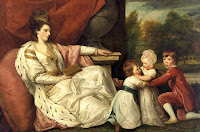 What is it about titles that sets us all a-flutter? What is it with all those dukes and earls and pedigreed persons and why have they become such a staple of historical romance?
What is it about titles that sets us all a-flutter? What is it with all those dukes and earls and pedigreed persons and why have they become such a staple of historical romance?
Maybe it’s because they’re powerful alpha males in tight pants. Or it’s a fundamental yearning manifested by a fascination with the young, rich, and pretty behaving badly (Paris, Britney et al) and attempts to establish a dynasty in the White House. We never had a chance at royalty after the unfortunate episode with the tea in Boston harbor, and now we’re trying to compensate.
I think it’s quite a reality check for Americans to realize how indifferent the English are about their great families, including the Windsors, unless they provide an excuse for a party or a really good national cry. All that anachronistic pomp and circumstance; all that inbred dullness. Yet the aristocracy still have that promise, even if it’s not fulfilled, of glamor and beauty and being bigger than life; and two hundred years ago they did have more interesting lives and more opportunities than the riff-raff. The rich and beautiful cavorting around Carlton House makes for better escapist reading than, say, trying to find firewood and cooking up the cabbage in the last smear of bacon fat.
 And look at the stuff they were good at! Sports, like fencing, all dash and expertise.
And look at the stuff they were good at! Sports, like fencing, all dash and expertise.
 Getting drunk, a favorite pastime of just about everyone in England, then and now, which I suppose takes a dash and expertise all of its own.
Getting drunk, a favorite pastime of just about everyone in England, then and now, which I suppose takes a dash and expertise all of its own.
 Hunting small furry things which apparently also enjoy the sport.
Hunting small furry things which apparently also enjoy the sport.
![]()
And all that good stuff with dogs and horses and art–even if the art technically didn’t belong to them but was lying around neglected somewhere classical.
So my question is, do you ever feel that we’ve gone overboard with aristos in romance? Does the appearance of yet another young, handsome, single duke make your heart sing or sink? Or do you accept it as part of the fantasy?














